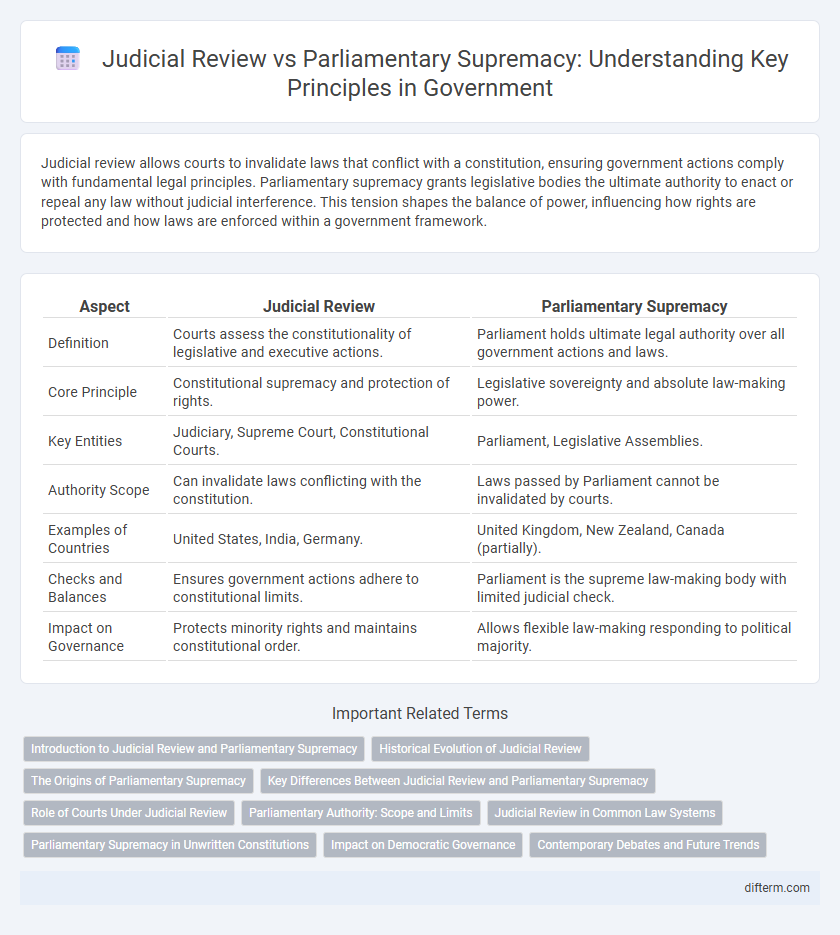Judicial review allows courts to invalidate laws that conflict with a constitution, ensuring government actions comply with fundamental legal principles. Parliamentary supremacy grants legislative bodies the ultimate authority to enact or repeal any law without judicial interference. This tension shapes the balance of power, influencing how rights are protected and how laws are enforced within a government framework.
Table of Comparison
| Aspect | Judicial Review | Parliamentary Supremacy |
|---|---|---|
| Definition | Courts assess the constitutionality of legislative and executive actions. | Parliament holds ultimate legal authority over all government actions and laws. |
| Core Principle | Constitutional supremacy and protection of rights. | Legislative sovereignty and absolute law-making power. |
| Key Entities | Judiciary, Supreme Court, Constitutional Courts. | Parliament, Legislative Assemblies. |
| Authority Scope | Can invalidate laws conflicting with the constitution. | Laws passed by Parliament cannot be invalidated by courts. |
| Examples of Countries | United States, India, Germany. | United Kingdom, New Zealand, Canada (partially). |
| Checks and Balances | Ensures government actions adhere to constitutional limits. | Parliament is the supreme law-making body with limited judicial check. |
| Impact on Governance | Protects minority rights and maintains constitutional order. | Allows flexible law-making responding to political majority. |
Introduction to Judicial Review and Parliamentary Supremacy
Judicial review empowers courts to evaluate the constitutionality of legislative and executive actions, ensuring compliance with fundamental laws and protecting individual rights. Parliamentary supremacy asserts that the legislature holds the highest authority, with the power to enact or repeal any law without judicial interference. The balance between these doctrines shapes constitutional governance by defining the scope of judicial oversight and legislative autonomy.
Historical Evolution of Judicial Review
Judicial review emerged during the 18th century as a critical mechanism to uphold constitutional principles against legislative overreach, exemplified by landmark cases such as Marbury v. Madison in 1803. The historical evolution of judicial review reflects a shift towards an independent judiciary empowered to invalidate laws conflicting with constitutional mandates. This development contrasts with parliamentary supremacy, which holds that elected legislatures possess ultimate legal authority, but judicial review prioritizes the protection of fundamental rights through constitutional interpretation.
The Origins of Parliamentary Supremacy
Parliamentary supremacy originated in 17th-century England, solidifying its authority through landmark events such as the Glorious Revolution of 1688 and the Bill of Rights 1689, which established Parliament's legislative dominance over the monarchy. This principle asserts that Parliament can make or repeal any law, rendering judicial review subordinate to parliamentary enactments. The evolution of parliamentary supremacy shaped constitutional law by prioritizing legislative sovereignty and limiting the judiciary's power to invalidate statutes.
Key Differences Between Judicial Review and Parliamentary Supremacy
Judicial review empowers courts to assess the constitutionality of legislative acts, ensuring laws comply with the constitution, whereas parliamentary supremacy grants the legislature ultimate authority to enact or repeal any law without judicial interference. Judicial review acts as a constitutional check on legislative power, limiting parliament's ability to pass unconstitutional laws. In contrast, parliamentary supremacy permits parliament to override judicial decisions and maintain legislative sovereignty, highlighting a fundamental tension in the separation of powers within government systems.
Role of Courts Under Judicial Review
Under judicial review, courts play a critical role in ensuring laws and government actions comply with constitutional principles, safeguarding individual rights against legislative overreach. Judicial review empowers courts to invalidate statutes that conflict with the constitution, reinforcing the rule of law and protecting democratic governance. This authority serves as a check on parliamentary supremacy, enabling the judiciary to maintain legal balance and constitutional integrity.
Parliamentary Authority: Scope and Limits
Parliamentary authority defines the legal scope within which legislative bodies enact laws, emphasizing its supremacy in the democratic framework. Judicial review functions as a mechanism to ensure laws comply with constitutional principles, but it does not negate parliamentary sovereignty unless constitutionally mandated. Limitations on parliamentary authority often arise from entrenched constitutional provisions, human rights protections, or devolved powers, shaping the balance between legislative freedom and judicial oversight.
Judicial Review in Common Law Systems
Judicial review in common law systems empowers courts to assess the constitutionality of legislative and executive actions, ensuring that government powers adhere to constitutional limits. This mechanism acts as a crucial check on parliamentary supremacy, enabling the judiciary to invalidate laws that violate fundamental rights or constitutional provisions. The balance between judicial review and parliamentary authority varies by jurisdiction, but in common law countries, courts often play a significant role in protecting individual rights through this oversight.
Parliamentary Supremacy in Unwritten Constitutions
Parliamentary supremacy in unwritten constitutions establishes that the legislative body holds ultimate authority, limiting judicial review powers to avoid overruling parliamentary decisions. This principle grants Parliament the ability to enact or repeal any law without judicial interference, reinforcing the sovereignty of elected representatives over constitutional adjudication. Countries like the United Kingdom exemplify this system, where constitutional rules are derived from statutes, conventions, and legal precedents rather than a single written document.
Impact on Democratic Governance
Judicial review ensures laws align with constitutional principles, protecting minority rights and preventing unconstitutional legislation by Parliament. Parliamentary supremacy grants elected representatives ultimate authority, reflecting the popular will and enabling responsive law-making. Balancing judicial review and parliamentary supremacy strengthens democratic governance by promoting accountability while safeguarding fundamental rights.
Contemporary Debates and Future Trends
Judicial review challenges parliamentary supremacy by empowering courts to invalidate legislation conflicting with constitutional principles, fueling contemporary debates over the balance of power between judiciary and legislature. Emerging trends suggest increasing judicial activism in constitutional interpretation, raising concerns about democratic accountability and legislative authority. Future trajectories may see enhanced checks and balances through hybrid mechanisms, addressing tensions between judicial oversight and parliamentary sovereignty in governing frameworks.
judicial review vs parliamentary supremacy Infographic

 difterm.com
difterm.com